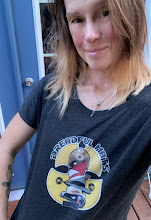 Out running on this blustery winter day, I considered how to honor my
mother on what would have been her 73rd birthday. But where to
start? Back at home, clean and in comfy clothes, I have dug out her journals and found a
birthday entry from around when she turned the age I am now, 41: December 30,
1980, the very day of her 41st birthday.
Out running on this blustery winter day, I considered how to honor my
mother on what would have been her 73rd birthday. But where to
start? Back at home, clean and in comfy clothes, I have dug out her journals and found a
birthday entry from around when she turned the age I am now, 41: December 30,
1980, the very day of her 41st birthday.Overall in her journals, she does not write about me constantly, or even often, despite our closeness, but I seem to pop up as a topic on her birthday entries. Perhaps this is because it was always the holiday break, and we were spending day after day together (and I know how challenging that can be with my two kids).
In this birthday entry, she worries that her friends, with whom we were
on holiday, were disapproving of my suddenly immature behavior (the usual:
bathroom and sex humor) and new use of the word “homosexual.” (She does not
describe how.) Though she thought I was being immature and inappropriate, she
wanted to defend me.
“As I write this, it sounds as if I am the child. This sitting apart
and writing is something I did, too, as a child.” She didn’t know how to
confront the issue, so she got it out in blue ink on paper in her lovely (but
hard to read) cursive. I understand this disappearing, finding a space to express
and create alone. I am doing it right now, as my husband and kids play with
Legos in the next room.
I want to remember her, celebrate her and connect with her today. That requires
quiet moments and writing. I am the apple to her tree in so many ways. Despite our
likenesses, I have been thinking about where we differ: She disliked much of
the music I like (“All I can hear is the pounding.”), she would disapprove of
my dark purple hair (“Oh, Caity, it looks so harsh.”), and she wondered at my
dedication to running (“I am just so impressed!”). I can hear her in our
dis-connections, too, and feel close to her.
My favorite line from this journal entry? “My new awareness and
acceptance of the tadpole qualities of men.” I don’t (necessarily) agree, but I
laughed out loud. A great line, if a tad, um, sexist. Then I think of my house,
in which I am the only female (even the dog is male), and I wonder if she might
have a point. Sometimes. Maybe. “Tadpole qualities.” *Giggle*


